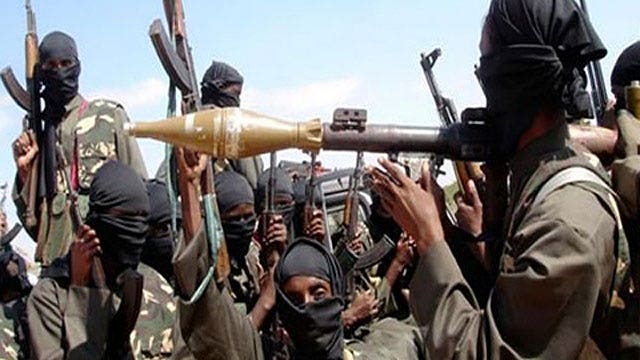Is Boko Haram stronger than ever in West Africa?
Former US Ambassadors to Nigeria Princeton Lyman and John Campbell recent attacks by the radical group
WASHINGTON – One of the most brutal and murderous Islamist militant groups has been steadily gaining ground, inflicting a streak of atrocities shocking by even their standards -- and it's not Al Qaeda or the Islamic State.
At the same time the world focuses on the terror attacks in France, the growing territory and lethality of Boko Haram, the Nigerian terror network which for a short time last year commanded global attention, is fueling calls in Washington for a new U.S. strategy.
“If we don’t stop it in its tracks, we are destined for this horrible group to not step back but to continue to be in power,” Rep. Sheila Jackson Lee, D-Texas, said.
Boko Haram slaughtered its way through another Nigerian town in early January, shortly before Islamic assassins were reigning terror on Paris – this time, killing more than 2,000 men, women and children while displacing another 30,000 residents along the way, rights groups say. Members of the Islamist terror group stormed the fishing town of Baga near Lake Chad. Houses, shops and other buildings were burned and the bodies of those murdered were left on the street to rot. The group, which had raided the town before, had come back for seconds.
A few days later, explosives were strapped to a girl, reported to be as young as 10, and detonated at a crowded marketplace. The attack killed more than a dozen people, authorities said. The explosives went off as the girl was being screened before entering the market. Boko Haram militants are the main suspects.
Boko Haram for months has blazed a path of destruction across the region while launching strikes in Cameroon and Chad. Their land grab now equals that of the Islamic State, in Iraq and Syria. Last year, more than 10,000 people died in the violence, according to an estimate by the Council on Foreign Relations.
In Washington, lawmakers are calling on the Obama administration to engage in a more serious and sustained military effort in Nigeria.
“It is clear that the United States needs a comprehensive strategy to address Boko Haram’s growing lethality,” Reps. Patrick Meehan, R-Pa., and Peter King, R-N.Y., wrote in a letter to Secretary of State John Kerry.
But doing that, some say, won’t be easy.
Complicating matters is a growing distrust between U.S. and Nigerian officials. Following the kidnapping of nearly 300 teenage girls in Nigeria last April -- which triggered the international "bring back our girls" campaign -- the U.S. pledged support and vowed to help find the missing teens. The U.S. sent surveillance drones and dispatched 30 intelligence and security experts including Gen. David Rodriguez, the top U.S. general for American missions in Africa, to aid the Nigerian military in its rescue efforts.
But in the 10 months that followed, not a single girl has been rescued. A few escaped their captors, but most are now feared to have been sold into slavery, married off or killed.
In December, the Nigerian government abruptly ended a U.S. effort to train troops to fight Boko Haram.
State Department officials did not say why the training was prematurely terminated but said the U.S. “will continue other aspects of the extensive bilateral security relationship, as well as all other assistance programs with Nigeria.”
A month earlier, the U.S. announced it would not sell Cobra helicopters to Nigeria out of concerns that the country could not use or maintain them.
Nigerian officials have accused the Obama administration of not doing enough, which triggered a biting response from the State Department about the Nigerian military’s human rights record. Human rights groups have long accused the military of carrying out killings, committing torture and illegally detaining residents.
“Many people I have met during this visit openly acknowledge human rights violations have been committed by the security forces,” Navi Pillay, U.N. High Commissioner for Human Rights, told reporters last year. “These have served to alienate communities, and create fertile ground for Boko Haram to cultivate new recruits.”
White House Press Secretary Josh Earnest on Monday pressured the Nigerian government to improve its human rights record. "But the United States is going to continue to monitor these events and continue to work with Nigeria on this," he said of Boko Haram.
Next month’s presidential elections in Nigeria add another layer of instability to the issue. The Feb. 14 election is expected to be a close contest between current President Goodluck Jonathan and challenger Muhammadu Buhari.
State Department spokeswoman Marie Harf said Tuesday that Boko Haram has a record of trying to “inflame tensions” through fear and intimidation and suggested the upcoming election is playing a role in the sharp escalation of attacks.
"We have seen that as one of their tactics and that is why it is so important to move forward with the election, because we believe it’s important,” she said.
Jackson Lee told Fox News she hopes the Nigerian government reconsiders letting the U.S. help.
“It’s important that our military resources engage with the government over there,” she said, adding that Nigeria should “accept the fact they can’t do it alone.”
Jackson was part of the four-member U.S. delegation that visited Nigeria following the kidnapping of the teenage girls in Chibok. She has also pushed for the government of Nigeria to establish a national victim fund for all of the victims “who are suffering at the hands of Boko Haram.”
Fox News' Jennifer Griffin contributed to this report.












































